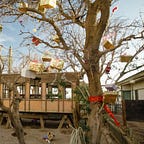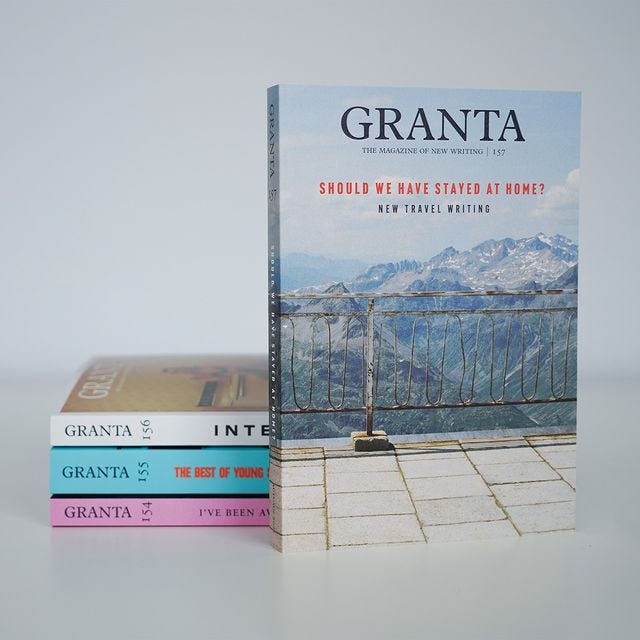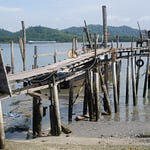From a short story by Ayşegül Savaş called Future Selves, after a couple takes a look an apartment they think capacious enough for their growing aspirations:
After the visit, we could find no café in the neighborhood at which to sit and talk about our impressions, so we took the train back. On the way, we both said that we’d liked the diversity of the area, and would be excited to live there, though it also seemed that we might not be able to become part of the community, that we’d be living shuttered within the confines of the splendid loft, travelling all the way to the city whenever we went out. Over drinks the following evening, Sami told us he’d take the train to visit us on weekends. He was such a good friend to us, always offering his support of our choices.

My inbox is burgeoning with year-end round-ups and reflections, as yours probably is. I’m not so adept at such things—not reflecting per se (I feel like I’m constantly reflecting, as a writer), but reflecting on time, prompt on occasion. This year, it feels even more difficult.
I’ve tended to see my life as being divided into years-long chapters, and this one, which started in late 2019 doesn’t feel like it’s ended yet. The same considerations that underpinned the pandemic for me, on how best to live, love, and work, still preoccupy my mind. I have not yet caught on to that rumbling undertow that might catapult me into yet a different groove, though I have felt it, while worrying over ideas in recent weeks until they either animate or crumble. I’m waiting—willing—for something to take shape.
So here’s a good old Landmarkings round-up for now, back to just one instalment. May you find something interesting in it. At the turn of the new year, I hope you get to hold your family, your cats and dogs, and your dearest ones close. And I’m sending you all my best wishes for the times that lie ahead.
A world at once quotidian, absurd, brutal, poignant, and extraordinary
A very long but comprehensive first-person look at what happened in Afghanistan—Inside the Fall of Kabul by Matthieu Aikins (who, btw, also wrote that great piece on Syria’s White Helmets, Whoever Saves A Life):
It was noon when I got home, and I found my housemate, Jim, with his camera in hand, already wearing a traditional robe. I donned mine; we both spoke Dari and could usually pass for locals. He wanted to take a walk and see what was happening in our neighborhood; it wasn’t clear to us, from the rumors and official denials on Twitter, whether the Taliban had actually entered Kabul.
The last shopkeepers were locking their gates as we walked down Chicken Street. Workers were rushing out of their offices and heading home. Now and again, we could hear scattered gunshots. There was a police headquarters and ministry nearby; some guards were still in uniform, but others stood wearing robes, ready to run. Some checkpoints were deserted.
A police commander lived on our street, and when we got back, we found his guards milling outside his house, most of them in plainclothes already. I had a sudden sense of the fragility of the social contract that bound us; our shared reality was melting into air. I was as worried about being robbed or shot by them as I was about the Taliban.
The Secretive Prisons that Keep Migrants Out of Europe by Ian Urbina, as part of The Outlaw Ocean project (which continues where his book left off):
In the past six years, the European Union, weary of the financial and political costs of receiving migrants from sub-Saharan Africa, has created a shadow immigration system that stops them before they reach Europe. It has equipped and trained the Libyan Coast Guard, a quasi-military organization linked to militias in the country, to patrol the Mediterranean, sabotaging humanitarian rescue operations and capturing migrants. The migrants are then detained indefinitely in a network of profit-making prisons run by the militias.
Yan Cong, Beimeng Fu, and Ye Charlotte Ming translate visual storytelling on China for English-speaking audiences in their newsletter Far and Near, and their latest window on that world is fascinating:
A school in Harbin, Heilongjiang province has been teaching business drinking etiquette—from how much to pour, to who to toast first and what to say when making the toasts. The most telling part of the video is the interview with the students: a businesswoman, a red wine salesman, and an accountant. Few of them enjoy drinking and socializing on such occasions and feel compelled to put on a disguise and suck up to their superiors or clients. But most agree that chugging that glass of beer or Baijiu is an important, possibly the only, way to cement a deal, and thus to advance one’s career and get ahead in life.
Selections here sometimes mirror the things I’ve been wondering about, which may not be new. Here, a piece by Archie Bland on the alternating perniciousness and vapidness of “banter” in British culture:
The trust game in banter was traditionally supposed to be: do you trust me when I say we’re friends in spite of the mean things I’m saying about you? But now there’s a second version of the game: do I trust you not to tell anyone the mean things I’m saying about other people? “I think originally it was a harmless thing,” said Cameron, whose analysis is rooted in an archive of male group conversation, mostly recorded by her students, that goes back to the 1980s. “But then it started to be used as an excuse when men were caught out engaging in forms of it that weren’t so harmless.”
I wonder if Calcuttan friends will find this next piece romanticized, but the idea of adda—I am unsure if, in my lone wanderings about the city in 2019, I had managed to experience the real thing—was something I was searching for (particularly after reading passages on it in Kushanava Choudhury’s The Epic City, a book I can’t recommend enough). Coffee or Chai? At 2 Kolkata Cafes, ‘Adda’ Is What’s Really on the Menu by Mujib Mashal:
“Adda is something that goes unnoticed—because it’s so part of our every day and it’s so integral to the identity of being a Bengali,” said Dr. Nabamita Das, a professor of sociology at Presidency University in Kolkata who wrote her doctoral thesis on adda. “And when you think about adda you think about adda integrally tied to the space of adda—you talk about the Coffee House adda, the Favorite Cabin adda.” Some of Bengal’s favorite icons would hold adda at the Coffee House, from the legendary filmmaker Satyajit Ray to Amartya Sen, who won the Nobel in economic science. Many of the city’s intellectual giants have spoken fondly of how the coffee and conversation shaped their worldview, likening each table to its own literary salon.
Pigs to the slaughter by Leighton Woodhouse—“The [U.S.] meat industry’s response to COVID-19 was a confluence of cruelty to animals and workers alike—yet the owners are doing better than ever.”
To date, an estimated 86,000 workers have caught COVID-19 and at least 423 have lost their lives to it. Today, fewer workers are getting sick because of the vaccines, but one poultry worker told me that at her plant, managers had learned from the pandemic that they can keep up the same pace of production with fewer workers. They never bothered hiring new staff to replace the workers they’d lost to COVID; they’re just pushing the remaining workers even harder. That’s led to fatigue and injury, which is a hazard to workers and animals alike. Whenever workers are pushed to the brink, animal welfare suffers too, as tired workers means less focused workers, and that can mean animals not being fully killed before they get through the kill line, which means they’re eviscerated while still alive.
In China, Bragging About Your Wealth Can Get You Censored by Vivian Wang and Joy Dong:
The Chinese authorities have declared war on content deemed to be “flaunting wealth,” amid sweeping calls by China’s leader, Xi Jinping, to combat inequality. As Mr. Xi positions himself for a third term, he has cast himself as a man of the people, leading a campaign against entrenched interests.
London No Longer Has One Chinatown. It Has Many by Angela Hui:
Migration isn’t limited to the Cantonese south any more; China’s growing middle and upper-classes are exploring the world and arriving in London en masse, bending entire global industries as they go and fueling demand for goods and services from home. Attracting a younger generation to neighbourhoods like Aldgate, Hackney, Holborn, Lambeth and Victoria, the past two decades have seen a huge influx of investment from mainland China, and the number of traditionally-run family-owned Cantonese restaurants are dwindling, making way for more specialist, regional Chinese and pan-Asian businesses in a bid to appeal to this newer demographic, as well as attracting a broader spectrum of customers.
The Aldi effect: how one discount supermarket transformed the way Britain shops by Xan Rice reveals fascinating things about Aldi’s secretive, media-shy German founders (one of them having been kidnapped before) and how the supermarket chains work:
As anyone who has tried navigating a ram-packed Aldi on a Saturday afternoon will know, you still don’t go there for the ambience or relaxed shopping experience. “Aldi panic” at the till endures in the electronic age thanks to a simple innovation that allows for instant scanning of goods. Packaged products in all supermarkets come with a barcode, which the checkout assistant will locate and scan. But look closely at a packet of Aldi toilet rolls and you will see not one but four barcodes: two long ones down the sides, and one on each large flat surface. A container of butter has three barcodes; a bag of carrots has two. For kidney beans, a pinstripe barcode is wrapped around half of the can. This means that whichever way the assistant holds the product the scanner will register it.
From time to time I like to go back and share my favorite pieces of narrative nonfiction. One of them is The Contestant by the Peruvian writer Daniel Alarcón (who is, btw, equally skilled at fiction)—“Ruth Thalía Sayas Sánchez, a teenager from the outskirts of Lima, Peru, became an overnight sensation on a hit television game show. Then, she disappeared.”
Then came question number 18: Have you ever accepted money for sex?
Vilma bent over, as if in physical pain.
Ruth Thalía answered yes, and the show’s announcer, a disembodied, almost robotically precise woman’s voice, called out:
“The answer is… true.”
There was a long silence.
“Just twice,” Ruth Thalía explained. “We needed money. We were in a bad situation. It hasn’t happened since, and it won’t happen again.”
For this truthful admission, Ruth Thalía had won 15,000 soles, or about $5,300—almost ten months’ wages for someone living in Lima. Beto asked if she wanted to go on, in search of 50,000 soles.
Making sense our place in the world
Stupid Xenophobic Parrots: On Transitions and Transformation by Michelle Kuo, writing with unapologetic candour about her return migration to Taiwan (in the newsletter she writes with her husband, A Broad and Ample Road):
English has long been the best thing I’ve had going for me, proof I have something to offer the world. It gave me confidence as a shy kid, helped me create something out of myself. It made me virtuous, a woman of action. A word after a word after a word, as Margaret Atwood wrote, is power. English made me a teacher, encouraging students to find their own voice; it made me a lawyer, crafting legal briefs to sculpt fury and kill doubt. It made me a wife, crying as I wrote my marriage vows.
Did it make me a daughter? That’s more complicated. My parents were always proud of my love of books and my achievements as a writer, even though it meant losing something in the way I communicated with them. I think if a Faustian devil had said I will grant your child mastery of English, on the condition that she will be dumb to your mother tongue and never understand a word you say, they still would have agreed.
Somehow, I had never read this piece. The 15 Year Layover by Michael Paterniti tells the extraordinary story of the man who inspired Spielberg’s The Terminal. Due to some truly mind-boggling confluence of circumstances, he lived, waiting, at Charles de Gaulle airport for eighteen years before he had to be hospitalized due to illness:
Alfred's odyssey had begun when he was a young man from a well-to-do family living in Iran and had ended here on an airport bench in Paris, by mistake. Twenty years ago, while living in Belgium, he'd simply wanted to go to England by boat. But having rid himself of his identification papers during the voyage, he'd fallen into a twilight limbo as a nationless, unidentifiable person no one wanted, bounced from Belgium to England to France, where, finally, he'd been left stranded at Charles de Gaulle Airport. He'd lived there ever since.
Watch the deliciously flamboyant music videos (I feel like it captures perfectly a kind of humour from our part of the world—simultaneously campy, nerdy, and ironic), filmed against familiar tropical backdrops, by Yung Raja—a Singaporean who raps in English and Tamil, in this profile by Nyshka Chandran with photographs by Lenne Chai (who, btw, also shot this brilliant fashion spread imagining what a queer Singaporean wedding would look like).
A view of home
No one article could capture the full scale and devastation of the floods in Malaysia—the worst since 2014, at least 48 dead—or the community relief efforts that have sprung up to make up for the sore lack of government initiative; you’d have to refresh social media feeds constantly for that. Najjua Zulkefli, one of my favorite Malaysian photographers, shot an incredibly evocative photo essay. Fazry Ismail and Firdaus Latif too, captured moments that make me wish I were home to help in a way that goes beyond donating money. Kudos to friends and acquaintances helping in the clean-up. Oh, and did you see that burly croc that got washed out of the river onto a bridge?
Bornean communities locked into two-million-hectare carbon deal they don’t know about by John C. Cannon—more details here. In the same vein, a note on why indigenous communities are wary of carbon-offsetting schemes.
Terengganu state has passed a law to ban the sale of turtle eggs by June 2022 (it is commonly and openly sold here for consumption), by Bryan Yong for Macaranga—an environmental news outfit co-founded in 2019 by Yao-Hua Law and Siew Lyn Wong that could use your monetary support.
Another scandal on how Malaysian companies—a Dyson supplier this time—treat migrant workers. Also: U.S. Customs bans fifth Malaysian glove maker over alleged forced labor!
A Thousand Thousand Islands is a series of beautifully illustrated zines inspired by Southeast Asia history and folklore, for use with fantasy adventure tabletop RPGs, by Zedeck Siew and Munkao. A helpful preview, if, like me, you know hardly anything about RPGs:
Something I wrote for the Heinrich-Böll-Stiftung Foundation teasing out some of the issues that were discussed at Women's Tribunal Malaysia—the first of its kind in Malaysia.
Malaysian food via London: Escaping the Roti King Queue by Jonathan Nunn of the Vittles newsletter. (Which also contains a couple of passages I wholeheartedly agree with on the new not-really-a-queue queue system that has infected some of the city’s restaurants. Just take bookings already!)
Reimagining our world (for better or worse)
Octopuses, crabs, and lobsters will be recognized as ‘sentient beings’ in U.K. by Kelsey Vlamis. Coincidentally, the news came immediately after I watched My Octopus Teacher (on Netflix), which is really very profound, and as affecting as people say it is. I realize I knew nothing about octopuses. You will marvel at what it is capable of, the relationship we’re capable of having with non-human creatures, and what that might tell us about ourselves.
Our Self-Imposed Scarcity of Nice Places by Daniel Herriges
The Year Basic Income Programs Went Mainstream by Sarah Holder
In the works for years, a suicide machine will soon be tested in Switzerland by Julian Mark
Why rich countries could be sued for destroying the climate by Jocelyn Timperley
Inside Mexico’s Historic Lawsuit Targeting U.S. Gun Companies by Ryan Devereaux
What if we didn’t build a single new building in 2022? by Elissaveta M. Brandon
Saving lives and making money: Can humanitarian impact bonds marry the two? by Ben Parker
After two failed attempts, Canada bans conversion therapy by Rachel Treisman
Rohingya sue Facebook for £150bn over Myanmar genocide by Dan Milmo
To sink into
Something to think about
Like Ayşegül Savaş’s short story quoted at top, Deborah Levy’s memoir, Real Estate (which I recently read and recommend), is concerned about finding a house to hold a home, and all the illusions of womanhood that come with it.
Seeing a woman feeding pigeons on the sidewalk, she finds herself thinking:
When I saw she had painted on her eyebrows so that one was much higher than the other, I suddenly felt exhausted and didn’t think I could commit to the slog and sorrow of her back story. I saw her as a child with both eyebrows in the right place, but knew I would have to track the long female journey to the left eyebrow floating near her hairline. As a structure for a film, that was quite appealing. I was also thinking about my best male friend’s idea that his wife, Nadia, was happy but pretended to be unhappy. Why did he think she was pretending?
And I leave you with…
A belated Christmas Carol:
Thanks, as ever, for welcoming my letters to your inbox!
Happy new year ❤️
E.



















